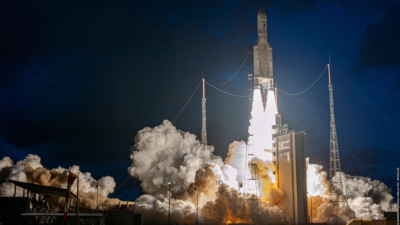Top Searches
- News
- India News
- Space PSU NSIL launches India’s 1st ‘demand-driven’ communication sat
Space PSU NSIL launches India’s 1st ‘demand-driven’ communication sat

European space agency's Ariane-5 VA257 rocket lifting off with GSat-24 and co-passenger MEASAT-3D from French Guiana on Thursday.
NEW DELHI: In a giant step towards rolling out the Modi government’s space reforms, public sector entity NewSpace India Limited (NSIL) on Thursday successfully undertook the launch of Gsat-24, its first “demand-driven” communication satellite mission, by using the services of French company Arianespace’s Ariane 5 rocket from French Guiana. This is the first time the NSIL has leased out the entire satellite capacity to direct-to-home (DTH) service provider Tata Play for 15 years even before the launch.
Gsat-24, which weighs a massive 4,180 kg at lift-off and has a mission life of 15 years, is a 24 Ku-band communication satellite meant for meeting the DTH communication needs of the country. ‘Demand-driven’ mode basically means when a satellite is launched, one will know who the end customers are going to be. Earlier, the mode was more supply driven, with capacity being leased after the launch. Gsat-24 is the first of the many ‘demand-driven’ missions that NSIL would undertake in the coming years.
With the successful launch of Gsat-24, NSIL will be owning and operating nearly 11 communication satellites in-orbit and will meet the bulk of the communication needs of the country, a Department of Space statement said. Built by Isro for NSIL, the satellite was successfully placed into the geostationary orbit by the Ariane 5 rocket nearly 40 minutes after liftoff at 3.20 hours (IST).
“Today’s successful mission of Gsat-24 is a major step forward for NSIL in commercially meeting the DTH communication needs of the country using indigenously built satellite solutions from Isro,” Isro chairman and DoS secretary S Somanath said.
Post-separation of Gsat-24 satellite, Isro's Master Control Facility at Hassan, Karnataka, took control of the satellite and initial data received indicates good health of the satellite. Co-passenger with Gsat-24 was MEASAT-3d for the Malaysian operator MEASAT, which too was launched successfully.
As part of the government’s “space reforms” announced by FM Nirmala Sitharaman in June 2020, NSIL was mandated to undertake operational satellite missions on a “demand driven” model, wherein it has the responsibility to build, launch, own & operate satellites and provide services to its committed customer.
Gsat-24, which weighs a massive 4,180 kg at lift-off and has a mission life of 15 years, is a 24 Ku-band communication satellite meant for meeting the DTH communication needs of the country. ‘Demand-driven’ mode basically means when a satellite is launched, one will know who the end customers are going to be. Earlier, the mode was more supply driven, with capacity being leased after the launch. Gsat-24 is the first of the many ‘demand-driven’ missions that NSIL would undertake in the coming years.
With the successful launch of Gsat-24, NSIL will be owning and operating nearly 11 communication satellites in-orbit and will meet the bulk of the communication needs of the country, a Department of Space statement said. Built by Isro for NSIL, the satellite was successfully placed into the geostationary orbit by the Ariane 5 rocket nearly 40 minutes after liftoff at 3.20 hours (IST).
“Today’s successful mission of Gsat-24 is a major step forward for NSIL in commercially meeting the DTH communication needs of the country using indigenously built satellite solutions from Isro,” Isro chairman and DoS secretary S Somanath said.
Post-separation of Gsat-24 satellite, Isro's Master Control Facility at Hassan, Karnataka, took control of the satellite and initial data received indicates good health of the satellite. Co-passenger with Gsat-24 was MEASAT-3d for the Malaysian operator MEASAT, which too was launched successfully.
As part of the government’s “space reforms” announced by FM Nirmala Sitharaman in June 2020, NSIL was mandated to undertake operational satellite missions on a “demand driven” model, wherein it has the responsibility to build, launch, own & operate satellites and provide services to its committed customer.
FOLLOW US ON SOCIAL MEDIA
FacebookTwitterInstagramKOO APPYOUTUBE

Start a Conversation
end of article









